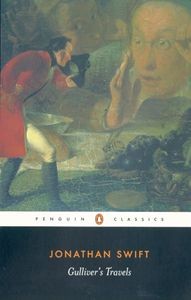Gulliver's Travels by Jonathan Swift
What I said then:
He’s little! He’s big! It’s a satire! A Hollywood remake is on its way starring Jack Black! God help us all.
What I say now:
Anyway, to the book. I was slightly dismayed when I read the introduction and discovered this book was written in the early 18th century. Ignoramus that I am, I'd imagined it was Victorian-era, so to discover it was 150 years older than that made me a bit nervous. I don't think I've ever loved anything written before about 1820 (yep, Jane Austen, and I don't mind admitting it), so this was not a particularly pleasant discovery. However, Swift's writing soon put paid to my worries: there's nothing particularly difficult about his writing style. Indeed, considering Gulliver's Travels was written nearly 300 years ago, it's aged remarkably well. Succinct, clear and never overblown, the prose was perfectly accessible to a modern audience. Well ... it was to me, anyway.
A bigger issue, in the end, was the frustrating way this volume had been over-enthusiastically edited. By which I mean, there were a shitload of footnotes, most of which were simply defining the meanings of words that actually weren't all that obscure. Pretty much anybody with even a medium vocabulary, and anybody capable of inferring meaning from context, doesn't need explained to them that 'Zeal' means 'Passionate ardour for any person or cause', right? Or that 'Intelligence' can mean 'Information'. Come on, we've all seen spy movies, haven't we? Unfortunately, sometimes the targets of Swift's satire were completely specific to his time, so occasionally the footnotes were necessary to my understanding of the book ... so I couldn't just ignore them.
On the content of Gulliver's various travels, all I can really say is: there's a good reason why this book has lived on. Swift invents his different races --- the Lilliputians (they're small), the Brobdingnagians (they're big), and the Houyhnhnms (they're horses) --- with sophistication, wit, and wonderful attention to detail. Though it's Gulliver's travels in Lilliput and Brobdingnag that have the greatest hold on the popular consciousness, Swift saves his sharpest, most biting satire for the final chapter, Gulliver's stay with the Houyhnhnms. These horse-shaped beings are completely rational, and have organised their society in such a way as to make everybody within it perfectly content. By imagining a perfect society, then comparing it to his own, Swift tears everything about the human race to shreds. Our venality, our irrationality, our fears and mistakes and madnesses: Swift shows us just how foolish we puny humans are, by imagining a people free of all our faults. It's a wonderful (but also kind of horrible) piece of writing. Jonathan Swift was one mega-cynical guy.
As well as those three voyages, there's a fourth chapter which is less successful. Swift devotes this time to poking fun of 'natural philosophers' of his day, and their dubious experiments. After so much political satire, it seems an odd choice for a target, and given that those natural philosophers became the grandfathers of contemporary scientific thought, it doesn't really hit the mark. Still, nobody's perfect I guess.
All in all, Gulliver's Travels was a really enjoyable read. It holds a mirror up to the society of its time and doesn't like what it sees, and today we're enough like they were then to make the lessons Swift's teaching still valid. Perhaps even necessary.
(Before I sign off, let me apologise for the long delay between postings on here. To all four of my regular readers: sorry. Sometimes life gets in the way, you know? Basically, I've had two large writing projects bubbling away for several years now, and they both have kind of come to the boil at the same time. I've hinted cryptically about these 'large projects' in the past, but expect some biggish news soon. Oh look, I've gone and hinted cryptically again! Heehee ...)
Cheers, JC.
about to read: Dead Europe by Christos Tsiolkas
books to go: 86


No comments:
Post a Comment